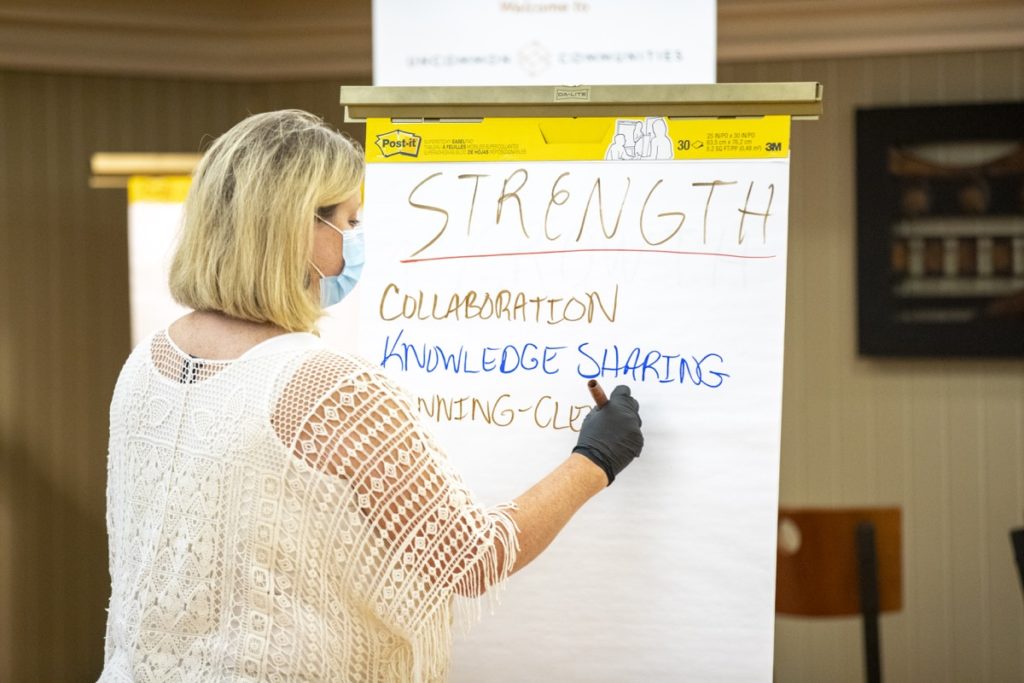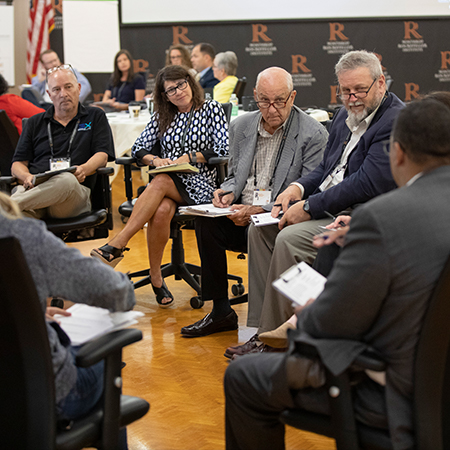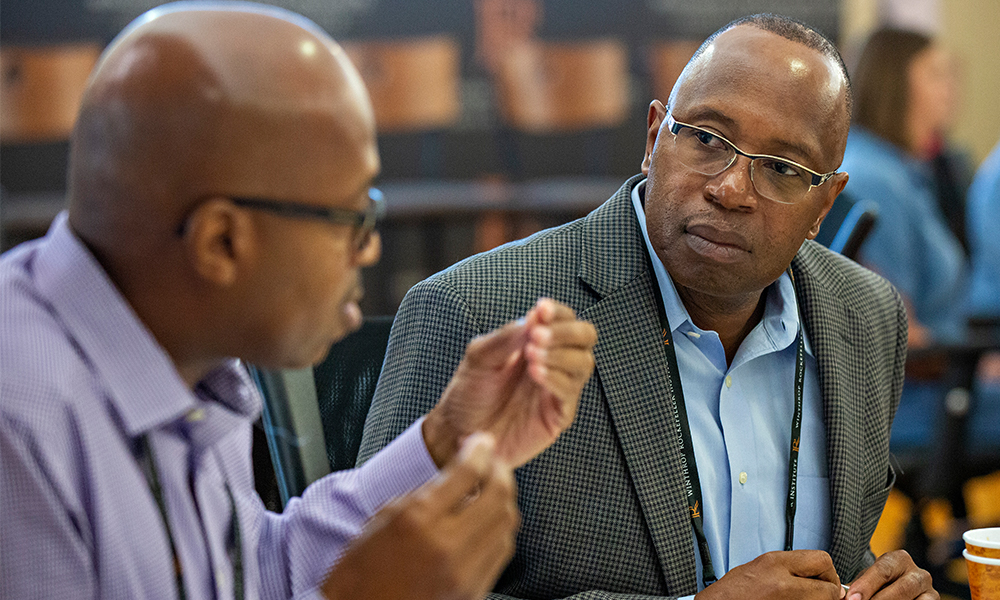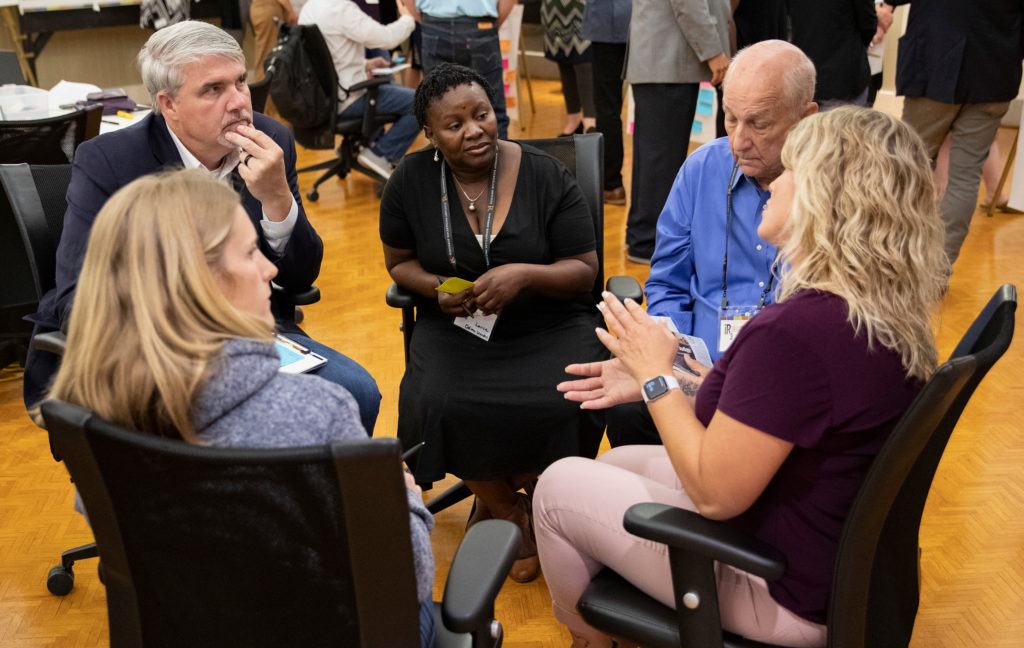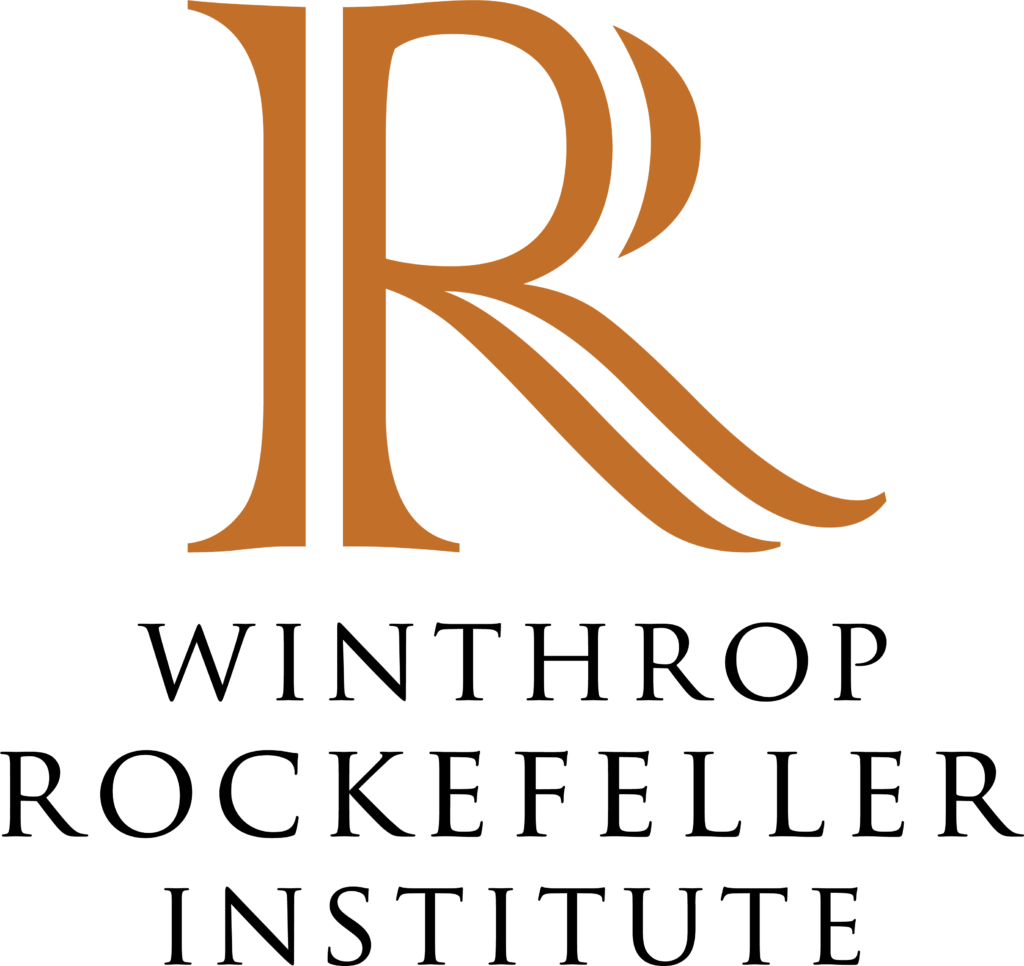The Winthrop Rockefeller Institute is a nonprofit organization that believes valuing diversity of opinion, practicing collaborative problem solving, and engaging in respectful dialogue combine to create transformational change. It is through our mission that we work towards a better future and the strategic plan detailed below will move us boldly toward our goals.
We call it the Rockefeller Ethic.
Our Mission
We continue Winthrop Rockefeller’s collaborative approach to creating transformational change.
Our Vision
We envision a future where every person is empowered to bring their unique perspective to bear on the most monumental of challenges and participate in the search for solutions.
Our Method
We engage our resources and Winthrop Rockefeller’s values to convene purposeful gatherings on his historic cattle farm. We do this work by employing the Rockefeller Ethic. The productive energy of our mountaintop location, coupled with the highest levels of hospitality, ensures all who come here are able to do their best work.
Why Now?
We launched a new mission, vision, and method in 2019 and needed a plan based on those bold statements that articulated the important areas of strategic focus for the Institute so we could chart a bright course for our future.
How Did You Create The Plan?
Consistent with our mission and purpose, the Institute put the Rockefeller Ethic into practice to form its five-year strategic plan, convening multiple stakeholders with diverse viewpoints in a series of thoughtful discussions about the future of the Institute. A staff strategic planning committee then gathered on multiple occasions to review the proposed projects and initiatives, identify areas of duplication, and determine a general timeline for implementation.
This collaborative approach to developing the Institute’s strategic plan ensured that all stakeholders had a voice in envisioning the future. The extended conversations around how to make that vision a reality helped Institute leaders maintain focus on the important elements of the plan even during an unexpected pause in operations due to the pandemic.
Who Contributed?
The Institute’s Board of Directors, executive leadership, staff, partners, clients, vendors, program participants, conference guests, and other key stakeholders in Arkansas’s political, business, nonprofit, and media organizations. We are especially grateful to the volunteers who gave the gift of their time to our Connect | Collaborate | Create Summit.
Our Priorities
Broader understanding and use of the Rockefeller Ethic
Goal: Preserve the timeless legacy of Winthrop Rockefeller by increasingly empowering more people to engage in mutual understanding and collaborative problem solving.
Objectives
How will we achieve these objectives?
Projects and initiatives to support teaching the Rockefeller Ethic will include engaging all board members, employees, donors, partners, and other key stakeholders in workshops and programs that teach the Rockefeller Ethic in action. Some examples include Walks with the Governor, Beyond Civility, and Tools for Respectful Dialogue.
Demonstrating the Rockefeller Ethic in action through core programmatic convenings around systemic issues like health, education, and corrections reform is key to the Institute’s future success. Future areas of core programmatic focus will be determined through collaboration with partners and advisory groups.
Intermediate and long-term program impacts will be measured in partnership with external partners, graduate students, and internal staff to accomplish the goal of publishing an annual impact report on the Institute’s website.
Strong & Collaborative Partnerships
Goal: Program partnerships model true collaboration with content, financial and convening partners who are mutually invested in program outcomes and enhance the diversity of program reach and awareness at the Institute.
Objectives
How will we achieve these objectives?
Organizations that align with the Institute’s mission and values can play an important role in recruitment, funding, and support for convenings designed to create transformational change. Organizations that want to enjoy the Institute’s pastoral campus and conference center can engage in the Rockefeller Ethic by taking advantage of several workshops offered on-site or partner by getting involved in programmatic initiatives.
The Institute benefits partnering organizations by facilitating collaborative problem solving, reporting on results, and fostering connections to other like-minded organizations. To aid in this work, the Institute will continue to engage student researchers from University of Arkansas System campuses for program evaluation and development.
Booking a conference at the Institute is the first point of entry for partnership opportunities. The conference application process allows the Institute to strategically invest its staff and funding resources in convenings that facilitate collaborative problem solving and contribute to transformational change in communities and systems.
Comprehensive Branding & Marketing Strategy
Goal: Continuously infuse the legacy of Winthrop Rockefeller into the stories of our work as a mission-driven non-profit organization whose impact is understood, known, and sought after by an increasingly diverse audience.
Objectives
How will we achieve these objectives?
Expanding digital storytelling options will be key in bringing Winthrop Rockefeller’s story to life for the audience of today, as is our new website that tells the story of the Institute’s mission, vision, and the Rockefeller Ethic. The Institute will engage student researchers for archival research to support this storytelling.
Along with storytelling, communication to all internal and external audiences will emphasize the Institute’s mission and value proposition, providing clear avenues for participation.
Conference group recruitment will focus on organizations and groups that are committing to a collaborative problem solving approach in their work. A priority will be given to conference groups directly engaged in mission related services or activities.
Objectives
How will we achieve these objectives?
Five key elements of a culture of philanthropy inform the Institute’s objectives in this area.
- Belief in the mission
- Opportunities to engage stakeholders in our mission
- Alignment of organizational needs with donor interests and values
- Excellent stewardship
- Genuine appreciation and respect
Fundraising strategies for annual, major, and planned gifts will be a key focus of development over the next five years. Key projects and initiatives include developing a list of strategic funding priorities, naming opportunities, identifying planned giving prospects, establishing donor pipelines, and increasing opportunities for volunteers.
The Institute will emphasize the importance of giving time, talent, and spiritual strength to support transformational change. Establishing a “Friends of the Institute” network will help mobilize ambassadors for the mission and all conference and program guests will be invited to learn about opportunities for engagement beyond financial giving.
Operational Excellence
Goal: Cultivate a mission-centered environment for employees that includes competitive salaries and benefits, the tools, technology, and resources to create an unparalleled work and guest experience that is grounded in diversity and inclusion; and inviting facilities that preserve the historical integrity of the campus.
Objectives
How will we achieve these objectives?
Providing excellent services in hospitality, conference planning, education, and facilitation starts with a committed group of people who find joy in rewarding work. Succession planning, professional development, and a five-year benefits and compensation plan will be a key area of focus for our employees over the next five years. Recruitment strategies will emphasize diversity in the workforce, cross-training, and internships.
Successful recruitment of a diverse workforce necessitates a culture of belonging and inclusion. Together with staff and advisors, the Institute will examine its priorities and values around diversity, equity, and inclusion to create and implement an actionable DEI plan. DEI priorities and values will extend beyond employment efforts to the provision of services, partnership opportunities, and programming as well.
Unburdening guests includes attending to our historic campus and its buildings. In consultation with our board, employees, and advisors, the Institute will develop a ten-year master facilities plan for our facilities and grounds, seeking a balance between the historic integrity of our place and the needs of our guests in today’s environment.
